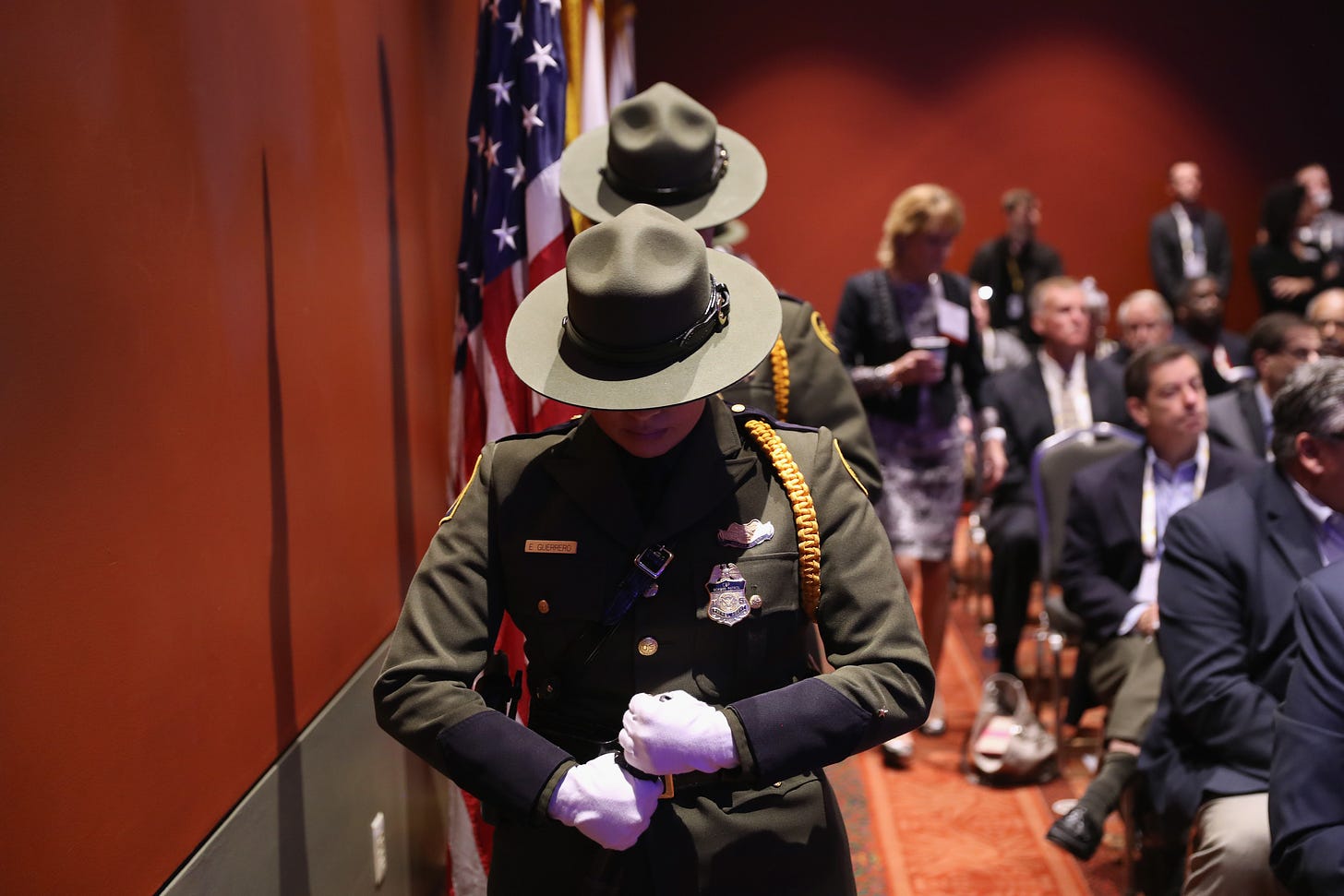Why the Supreme Court Handed Biden an Immigration Win
Plus: Trump’s Document Stash Put American Lives at Risk
Recently in The Bulwark:
You can support The Bulwark by subscribing to Bulwark+ or just by sharing this newsletter with someone you think would value it.
KIMBERLY WEHLE: Why the Supreme Court Handed Biden an Immigration Win.
THE SUPREME COURT’S ANNOUNCEMENT on Friday of its ruling in United States v. Texas felt refreshingly moderate. In a majority opinion authored by Justice Brett Kavanaugh, the Court declined an invitation to substantially inflate the power of states to control federal immigration policy, deferring to the discretion of the Biden administration. In so doing, the Court’s conservative majority also resisted the temptation to gobble up more federal power for itself. Justice Samuel Alito was the lone dissenter.
The case involved guidelines issued in 2021 by the Secretary of Homeland Security, Alejandro Mayorkas, that govern how Immigration and Customs Enforcement (ICE) agents should prioritize the arrest and removal of noncitizens from the United States. The guidelines direct ICE personnel to focus on noncitizens who are (a) suspected terrorists or (b) dangerous criminals, or who (c) unlawfully entered the country only recently.
🎥 PODCASTS AND VIDEOS 🎧
Bulwark+ members can listen to an ad-free version of these podcasts on the player of their choice. Learn more at Bulwark+ Podcast FAQ.
LARRY PFEIFFER: Trump’s Document Stash Put American Lives at Risk.
THE CLASSIFIEDS DOCUMENTS THAT Donald Trump is charged with mishandling were marked “SECRET” or “TOP SECRET,” the highest classification we afford our nation’s secrets. By definition, the uncontrolled release of that information could be expected to cause “serious” or “exceptionally grave” damage (respectively) to our national security. As bad as that sounds, it gets worse: According to the indictment against Trump, eight of the TOP SECRET documents may have had information about or derived from so-called Special Access Programs (SAPs). The sensitivity of these documents was so great that prosecutors were obliged to redact even the codewords on the documents. The implication is that even publicly acknowledging the codenames of these projects, without discussing their operations at all, was deemed a great security risk.
These included documents about the nuclear capabilities of another country, military attacks by a foreign country, the military capabilities of a foreign country, the timeline and details of an attack in a foreign country, the regional military activity of a foreign country, the military activity of foreign countries and the United States, and military activity in a foreign country.
And as sensitive as the subjects of those documents are, what was really put at risk by our former commander-in-chief were the nation’s most sensitive activities and information derived from them.
JAMES C. CAPRETTA: We Used to Want Government to Work Well—And We Still Can.
WHEN YOU THINK BACK to the most consequential policy measures of the Clinton era—the North American Free Trade Agreement, welfare reform, and a handful of others—one that probably does not leap so readily to mind is the Government Performance and Results Act of 1993, a law intended to improve the functioning of the federal bureaucracy. But GPRA, despite its relative obscurity and the fact that it never quite delivered the transformation that its authors sought, was groundbreaking in its own way and deserves to be remembered. With the law’s thirtieth anniversary approaching later this summer, now is an appropriate time to look back on GPRA’s origins, take stock of how well it did what it supposed to, and consider what might come next.
🚨OVERTIME🚨
It’s Monday… And we hope you had a great weekend. I spent the weekend with family out in the country and spent the weekend reading A Walk in the Woods by Bill Bryson, so I could live vicariously through an old man who hiked much of the AT. I have accepted that I will never get to do more than a weekend on the AT, so this book is total catnip. If you haven’t read, it’s a deeply funny book. (Thanks, local library!) Or, if you’ve read it and haven’t seen it, there is also a movie.
This is why… you don’t make Dennis Kucinich your campaign manager. Getting shades of the UFO incident here.
Pence courts the libertarians… Making his debut in Reason magazine.
Is it too late for the GOP? Optimist Judge Luttig weighs in at the NY Times.
The poisoning of the American mind… Part III from our friends at Connors Forum.
Meanwhile, in the Senate… The Elon / Zuckerberg fight concept is… making its way to the halls of Congress. Let’s leave aside the fact that this is a bad idea that sends the wrong message to children, it is an opportunity to turn the rotunda into the ThunderDome.
…and at Fox… Meet the new face of primetime.
Is a rebranding in order? The niche “Christian” “humor” site Babylon Bee had this distasteful post on the Russia news. In this space, it will hereafter be referred to as the Вавилонская пчела.
In New Hampshire… The DeSantis campaign is faltering, but don’t fret, the campaign has a new plank guaranteed to piss off millions of voters.
What makes a social studies textbook “woke?” Judd Legum and Popular.info took a look to find out.
Texas Gov. Duped… By the “Dunning Kruger Times.” Seriously. Then again, Abbott thought Barack Obama was going to invade Texas, so he’ll fall for anything, it seems.
Who is keeping Iran’s F-14s flying? Our friend Ward Carroll with a history lesson on how they got them, and how they keep flying.
Lots of luck in your senior year… Making sense of the Bidenisms.
Hunting for Switzerland’s bunkers… A neat video journey.
—30—
Tech support questions? Email members@thebulwark.com. Questions for me? Respond to this message.
Editorial photos provided by Getty Images. For full credits, please consult the article.





